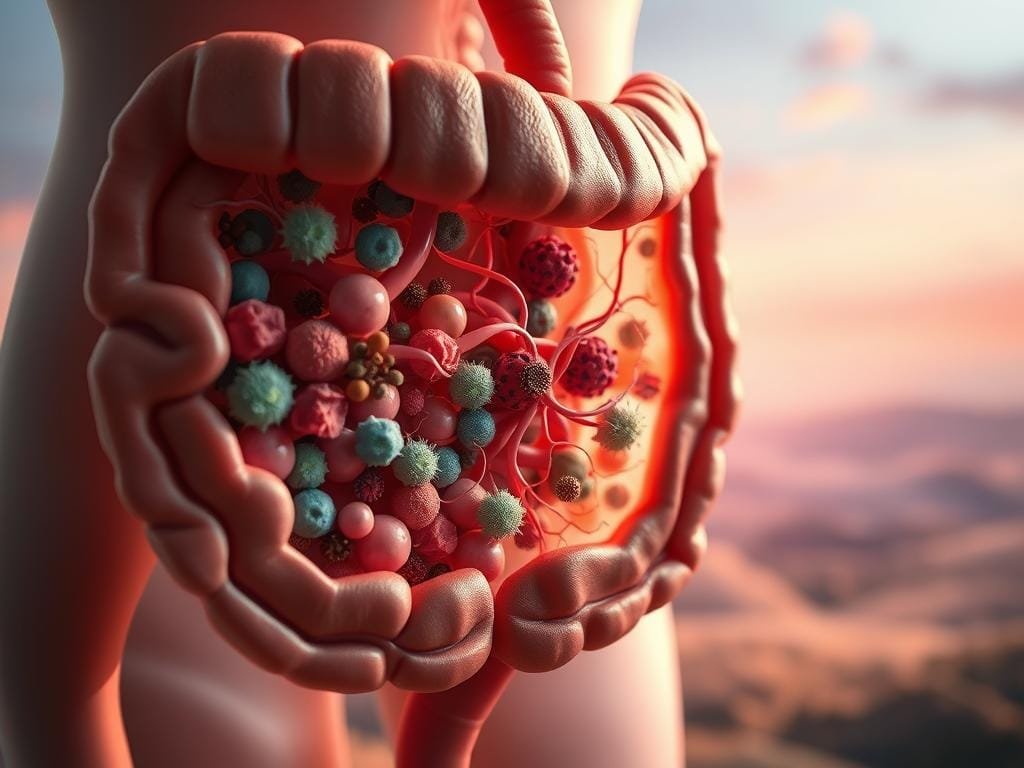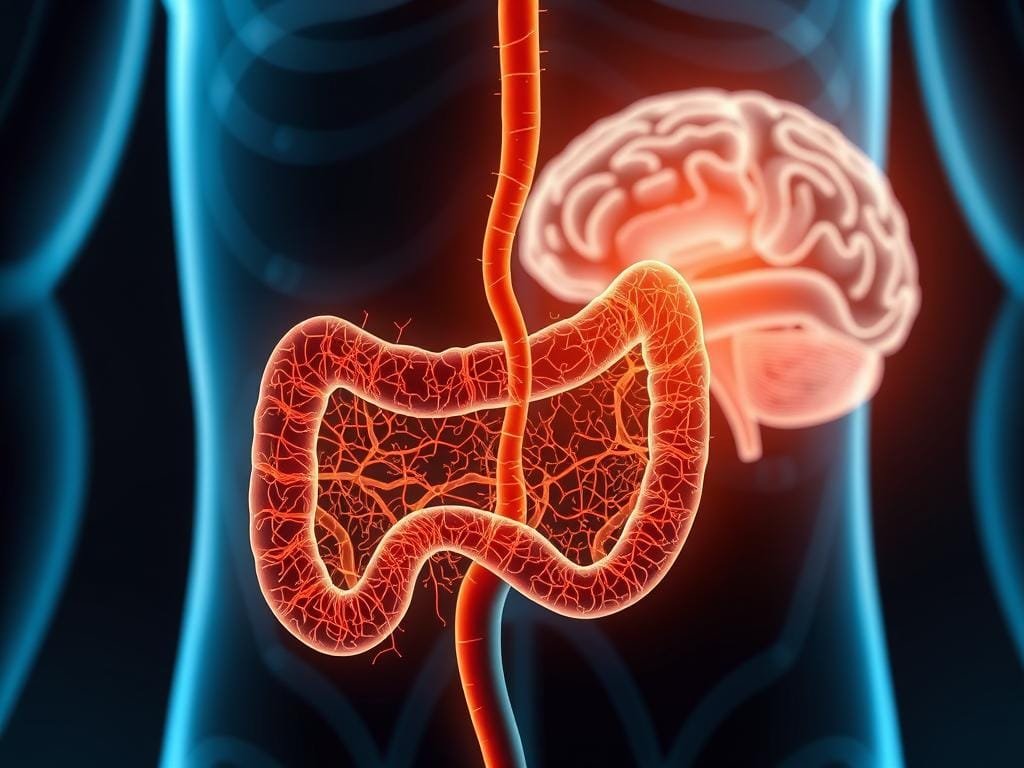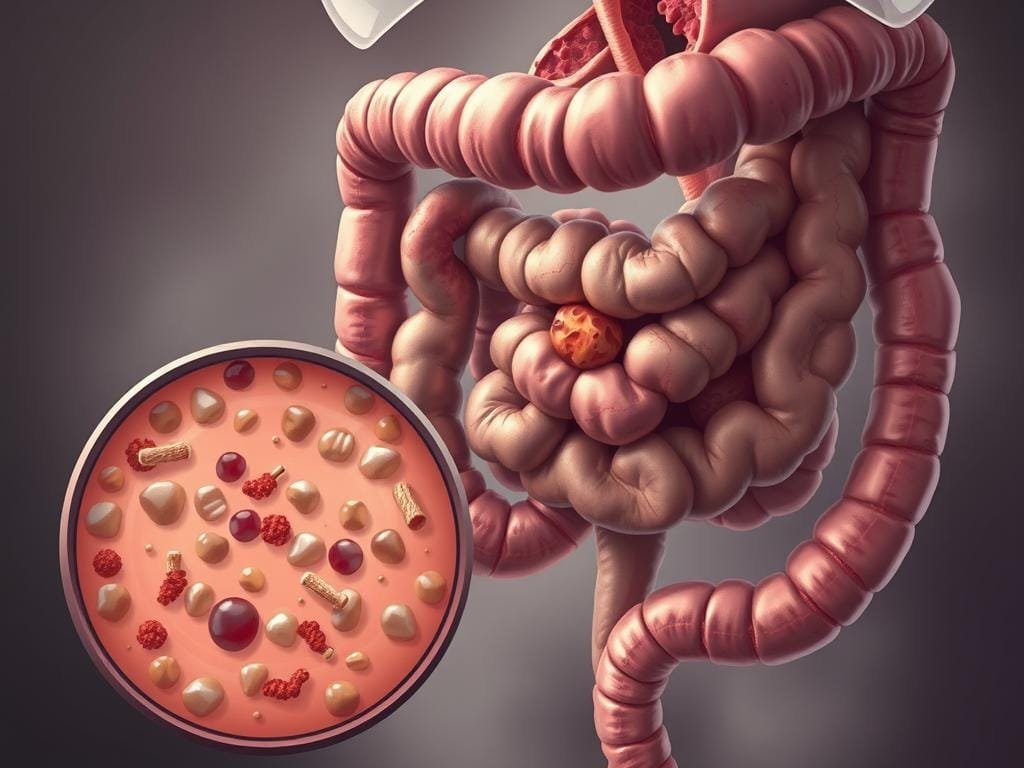Did you know an imbalance in your gut microbiome can impact your digestion and overall health? Recent studies show the gut microbiome is key to keeping you healthy. By linking your diet and digestion, you can improve your gut health.
Eating a balanced diet is vital for good digestion. Choose whole foods like fruits, veggies, whole grains, lean proteins, and healthy fats. This way, you can join the gut health revolution and enjoy a healthier digestive system.
Table of Contents
Key Takeaways
- A balanced diet is key for healthy digestion.
- Whole, unprocessed foods help your gut stay healthy.
- Foods high in fiber support good gut bacteria.
- Drinking enough water is important for your health.
- Eating foods of different colors means you get more nutrients.
The Science Behind Gut Health and Its Impact on Your Body
The science of gut health is fascinating. It shows how your microbiome affects your body. Your gut microbiome is full of bacteria, viruses, and fungi. It’s key to your health.
A healthy gut has a balanced microbiome. This balance is vital for a strong immune system and good metabolism. It also helps make vitamins. “A balanced gut microbiome is like an orchestra,” says Dr. Jane Smith. “Each member is important for harmony.”
What Constitutes a Healthy Digestive System
A healthy digestive system has a diverse and balanced gut microbiome. This balance is key for digesting food and absorbing nutrients. It also prevents digestive problems. Key parts of a healthy system include:
- A diverse gut microbiome with many beneficial bacteria
- A strong gut barrier to keep out toxins and undigested food
- Efficient digestive enzymes to break down food
Keeping this balance is important for your health. An imbalance can cause many problems, like digestive issues and obesity. It can even affect your mental health.
Why Your Gut Matters More Than You Think
Your gut is very important. It affects not just your digestion but your overall health. The gut-brain axis shows how your gut and brain talk to each other. This affects your mood and mental health.
“The gut is often called the ‘second brain’ because of its big impact on our health.”
A healthy gut is also key for a strong immune system. It helps make antibodies and activate immune cells. It also helps regulate metabolism, which affects weight and health.
In short, taking care of your gut microbiome is essential for your health. Eat well, use probiotics and prebiotics, and manage stress. This supports your gut and overall well-being.
Decoding Your Microbiome: The Ecosystem Within
Understanding your microbiome is key to better digestive health. Your gut is filled with trillions of microorganisms. They form a complex ecosystem called the gut microbiome. This ecosystem is vital for your health, affecting your immune system and mental well-being.

The Composition of a Healthy Gut Flora
A healthy gut has a variety of microorganisms. This variety is key to keeping your gut balanced. The gut microbiome includes bacteria, viruses, fungi, and more. They help with digestion, make vitamins, and fight off harmful pathogens.
Studies show a balanced gut microbiome boosts your immune system. A study by the Cleveland Clinic found that the gut microbiome shapes your immune system gut microbiome. This highlights the need for a balanced gut flora.
“The human gut microbiome is a complex ecosystem that plays a critical role in our overall health and well-being.”
How Your Microbiome Changes Throughout Life
Your microbiome changes over time. Diet, lifestyle, and environment greatly affect it. For example, eating fiber helps beneficial bacteria grow, while antibiotics can upset this balance.
| Factor | Impact on Microbiome |
|---|---|
| Diet | A diet high in fiber promotes beneficial bacteria |
| Antibiotics | Can disrupt the balance of gut flora |
| Lifestyle | Stress and lack of sleep can negatively affect microbiome diversity |
As you age, your gut microbiome changes. Knowing these changes helps keep your gut healthy. By choosing the right diet and lifestyle, you support your microbiome and overall health.
To improve your gut health, add probiotics and prebiotic-rich foods to your diet. Probiotics are live microorganisms that offer health benefits. Prebiotics feed beneficial bacteria, helping them grow and work better.
The Gut-Brain Axis: Your Second Brain at Work
Your digestive system and brain are connected through a complex network called the gut-brain axis. This system lets your gut and brain talk to each other. It affects your mood, thinking, and overall health.

How Your Digestive System Communicates with Your Mind
The gut-brain axis is a constant conversation between your gut and brain. Your gut makes neurotransmitters like serotonin and dopamine. These help control your mood and thinking.
A lot of your serotonin is made in your gut. To boost your mental health, eat foods high in fiber and nutrients. Learn more about improving digestion and health at this resource.
Improving Mental Wellness Through Digestive Health
Eating the right foods can greatly improve your mental health. A balanced diet with fermented foods, prebiotics, and probiotics is key. Foods like yogurt and sauerkraut help keep your gut healthy.
- Eat fermented foods to support your gut.
- Include prebiotic-rich foods like asparagus and bananas.
- Drink plenty of water to help your digestive system.
By focusing on your digestive health, you can improve your mental wellness. The link between your gut and brain shows the need for a holistic health approach. This includes both physical and mental health.
Recognizing Signs of an Unhealthy Gut
Your gut health is key to your overall well-being. Knowing the signs of an unhealthy gut is the first step to balance. An imbalance, or dysbiosis, can cause many health problems, from digestive issues to complex conditions.

Digestive Symptoms That Shouldn’t Be Ignored
Many digestive symptoms show an imbalance in your gut. These include bloating, stomach pain, and changes in bowel movements. If you often have these symptoms, it might mean your gut microbiome is off. Health experts at Piedmont say noticing these signs early is important.
Bloating and gas often point to gut health issues. An unbalanced gut can’t digest food well, leading to discomfort.
Surprising Non-Digestive Signs of Gut Imbalance
Gut imbalance can show in ways not related to digestion. For example, skin problems like acne or eczema can be linked to an unhealthy gut. Also, research shows a link between gut health and mental health. Mood swings, anxiety, and depression might mean your gut microbiome is out of balance.
“The gut-brain axis is a complex communication network that links the enteric nervous system to the central nervous system, and disturbances in this axis can lead to various health issues.”
Also, an unhealthy gut can raise the risk of autoimmune diseases and leaky gut syndrome. This is when the small intestine’s lining gets damaged, letting undigested food particles through. For more on gut health, check out Boost Healthy Life. They talk about natural supplements that help gut health.
How Your Diet Directly Shapes Your Gut Health
Eating a balanced diet is key to a healthy gut. The food you eat shapes your gut microbiome. It affects digestion and your overall health.
The Immediate Impact of Food Choices on Digestion
Your diet’s immediate effects on digestion are big. Eating gut-friendly foods like fruits, veggies, and whole grains boosts digestive health. They give you important nutrients and fiber.
But, a diet full of processed foods and sugars can mess with digestion. This can cause bloating and discomfort.
For example, eating foods high in fiber like broccoli or apples helps good bacteria in your gut. This aids digestion. On the other hand, foods high in processed ingredients slow digestion and upset your gut’s balance.

Long-Term Dietary Patterns and Microbiome Evolution
Long-term eating habits deeply affect your gut microbiome. Eating whole, unprocessed foods keeps your gut diverse and strong. This diversity is key for good digestion, immune function, and mental health.
A diet low in nutrients and fiber makes your gut microbiome less diverse. This can lead to digestive problems and other health issues. For instance, eating mostly processed foods can cause harmful bacteria to grow. This negatively affects your health.
| Dietary Component | Effect on Gut Health | Examples |
|---|---|---|
| Fiber-rich foods | Promotes beneficial bacteria, enhances digestion | Fruits, vegetables, whole grains |
| Processed foods | Disrupts gut balance, can cause digestive issues | Packaged snacks, sugary drinks |
| Fermented foods | Supports gut health with probiotics | Yogurt, sauerkraut, kimchi |
To keep your gut healthy, eat a gut health diet full of whole, nutrient-rich foods. Making smart food choices can greatly improve your gut health and overall well-being.
Harnessing the Power of Probiotics for Digestive Wellness
Probiotics are key for good digestion. They are live microorganisms that help your health. Adding them to your diet can balance your gut, ease digestion issues, and boost your overall health.
Essential Probiotic Strains and Their Benefits
Different probiotic strains have unique benefits. For example, Lactobacillus and Bifidobacterium are popular. Lactobacillus helps with digestion and strengthens the immune system. Bifidobacterium helps with IBS and improves gut health.
Here’s a quick look at some important probiotic strains and their benefits:
| Probiotic Strain | Benefits |
|---|---|
| Lactobacillus acidophilus | Improves lactose tolerance, supports immune system |
| Bifidobacterium lactis | Alleviates IBS symptoms, enhances gut barrier |
| Streptococcus thermophilus | Supports digestive health, improves immune function |
Incorporating Fermented Foods vs. Taking Supplements
You can get probiotics from fermented foods or supplements. Foods like yogurt, kefir, sauerkraut, and kimchi are full of probiotics. They also add extra nutrients. Supplements give you a focused dose of certain strains, which can help with specific health issues.
For more info on using probiotics, check out this resource. It dives deep into probiotics’ benefits and uses.
Prebiotics: The Essential Fuel for Your Beneficial Bacteria
Prebiotics are key to helping good bacteria grow in your gut. They are non-digestible fibers that feed the beneficial bacteria. This helps keep your digestive system healthy.
Types of Prebiotic Fibers and Their Mechanisms
There are many types of prebiotic fibers, each with its own benefits. Inulin, fructooligosaccharides (FOS), and galactooligosaccharides (GOS) are some examples. These fibers are not broken down in the stomach but are fermented by gut bacteria. This process helps beneficial bacteria grow.
Inulin is found in chicory root and artichokes. It boosts the growth of Bifidobacteria and Lactobacilli. These are good bacteria that help keep your gut healthy.
Top Food Sources to Feed Your Microbiome
Eating foods rich in prebiotics is a great way to support your gut. Here are some top sources:
- Asparagus
- Banana
- Onions
- Garlic
- Whole wheat bread
- Oats
- Barley
Eating these foods gives your beneficial bacteria the fuel they need. This supports your gut health. It can also improve digestion, boost your immune system, and even help your mental health.
For gut health tips, try to eat a variety of prebiotic-rich foods. This variety keeps your microbiome balanced and strong.
Designing Your Personalized Gut-Friendly Eating Plan
To keep your digestion healthy, create a diet plan that fits you. A good plan includes lots of whole, unprocessed foods. These foods help your gut stay healthy and ease digestion problems.
Daily Nutritional Guidelines for Optimal Digestion
For the best digestion, eat a balanced diet. Your meals should include:
- Fruits and veggies for fiber and antioxidants.
- Whole grains like brown rice and quinoa for energy and fiber.
- Lean proteins from poultry, fish, and legumes for health.
- Healthy fats in nuts, seeds, avocados, and olive oil for nutrient absorption.
Try to eat less processed and sugary foods. They can harm your gut. Drinking plenty of water is also key for your digestive health.
Sample Meal Plans for Different Digestive Needs
Your diet might need to change based on your digestive health. Here are some meal plans:
| Digestive Need | Sample Breakfast | Sample Lunch | Sample Dinner |
|---|---|---|---|
| General Gut Health | Oatmeal with fruits and nuts | Grilled chicken salad with whole-grain crackers | Baked salmon with quinoa and steamed vegetables |
| IBS (Irritable Bowel Syndrome) | Low-FODMAP yogurt with berries | Grilled chicken breast with gluten-free bread and avocado | Lean beef with roasted low-FODMAP vegetables |
| Inflammatory Bowel Disease (IBD) | Smoothie bowl with anti-inflammatory ingredients | Turkey and avocado wrap with mixed greens | Grilled chicken with omega-3 rich fatty fish and brown rice |
These meal plans are just examples. You can adjust them to fit your needs. Always talk to a healthcare professional or a registered dietitian for the best diet for you.
Expert Approaches to Common Digestive Issues
Tackling digestive health needs a full plan, say gastroenterologists and nutritionists. Issues like bloating, inflammation, and Irritable Bowel Syndrome (IBS) bother millions. They make life harder for many.
Dr. Jane Smith, a top gastroenterologist, says, “Knowing the cause of digestive problems is key to fixing them.” Personalized dietary plans help tackle specific gut health issues.
Gastroenterologists’ Recommendations for Bloating and Gas
Bloating and gas are big problems for many. Gastroenterologists advise keeping a food diary to find out what foods cause bloating. Foods like beans, cabbage, and broccoli are often the culprits.
“Changing your diet is often the first step to fight bloating and gas. Cutting down on FODMAPs can really help ease symptoms.”
Nutritionist Strategies for Inflammation and Leaky Gut
Nutritionists stress the need for an anti-inflammatory diet. This diet should include omega-3 fatty acids, antioxidants, and fiber. Foods like fatty fish, leafy greens, and whole grains are good choices.
- Add anti-inflammatory foods to your diet.
- Stay away from processed foods that can make inflammation worse.
- Think about taking probiotics and omega-3 fatty acids after talking to a doctor.
Dietary Interventions for IBS and Related Conditions
For IBS, changing your diet is key. Starting with a low FODMAP diet can help manage symptoms. Also, eating more soluble fiber can help with bowel movements.
| Dietary Component | Recommendation | Benefit |
|---|---|---|
| FODMAPs | Limit high FODMAP foods initially | Reduces IBS symptoms |
| Fiber | Increase soluble fiber | Regulates bowel movements |
| Probiotics | Consider supplementation | Enhances gut flora |
By following these expert tips, people can handle common digestive problems better. This can improve their gut health a lot.
Lifestyle Factors That Complement Your Gut Health Diet
To get your gut health in top shape, think about more than just what you eat. Stress, exercise, sleep, and staying hydrated are key too. They all help your digestive system work better.
Stress Management Techniques for Better Digestion
Stress can really mess with your gut health. It changes your gut’s good bacteria and makes digestion harder. So, finding ways to manage stress is very important for a healthy gut.
- Meditation and Mindfulness: These practices can lower stress, which is good for your gut.
- Yoga: Yoga mixes physical activity with deep breathing. It can help reduce stress and boost digestive health.
- Deep Breathing Exercises: Simple deep breaths can calm your mind and body. This helps lessen stress’s bad effects on your gut.
“The gut and the brain are connected through the gut-brain axis, and stress can significantly disrupt this delicate balance.”
Exercise, Sleep, and Hydration: Supporting Your Digestive System
Managing stress is just part of the equation for a healthy gut. Other lifestyle choices also matter a lot.
| Lifestyle Factor | Impact on Gut Health |
|---|---|
| Regular Exercise | Boosts gut movement and supports a wide range of gut bacteria. |
| Adequate Sleep | Helps keep your gut’s bacteria in balance and aids digestion. |
| Proper Hydration | Makes digestion and nutrient absorption easier, preventing constipation. |
Adding these lifestyle habits to your daily life can greatly help your gut health. And it’s good for your overall health too.
Conclusion: Embracing the Gut Health Revolution for Lifelong Wellness
The connection between diet and digestion is key to your gut health and wellness. Learning about gut health and adding gut-friendly habits to your life can lead to lifelong wellness.
Joining the gut health revolution means choosing the right foods and lifestyle. This can improve your health, boost energy, and clear your mind. It leads to a better life overall.
Starting your gut health journey is easy. Begin with a balanced diet full of whole foods. Think about adding probiotics and prebiotics to help your gut. Taking care of your gut is a smart investment in your long-term health.

